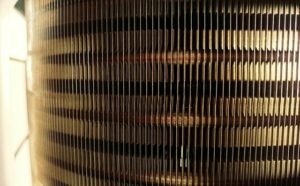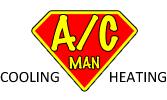Heat Pump Or Air Conditioner: Which Is Better?
To give it the simplest possible definition, a heat pump is an air conditioner that also has the ability to heat the air it delivers as well as cool it down.
 The benefits of a heat pump start getting interesting when you find yourself in need of a replacement air conditioner or even an all-new HVAC system. Under the right circumstances, a heat pump can replace an air conditioner and even a heating system at the same time. You have to have a clear understanding of your needs and the capabilities of a heat pump before deciding whether or not one’s right for your home.
The benefits of a heat pump start getting interesting when you find yourself in need of a replacement air conditioner or even an all-new HVAC system. Under the right circumstances, a heat pump can replace an air conditioner and even a heating system at the same time. You have to have a clear understanding of your needs and the capabilities of a heat pump before deciding whether or not one’s right for your home.
This article will give you a thorough run-down on the differences between air conditioners and heat pumps and explain the benefits and potential drawbacks of a heat pump.
The Key Differences Between Heat Pumps And Air Conditioners
Heat pumps and air conditioners operate exactly the same way in hot summer months when their job is to cool down an indoors space. They both extract heat from the indoor air and dump it outside the building.
When the weather turns cold, though, the traditional air conditioner’s job is done. In most homes and businesses, air conditioners are teamed up with furnaces or electric heaters to deliver the heat required for keeping indoor spaces comfortable.
A heat pump gets its name from its ability to inject heat into space as well as take it out.
How does a heat pump do this? As we’ve already suggested, it’s capable of running in reverse to put heat into an indoor space instead of taking it out. That means that a heat pump has the ability to gather heat from the outside air, even in cold weather.
That sounds a little crazy, right? Rest assured, the technology is in there to make it all work. While the outdoor air certainly feels chilly in the winter, it still contains plenty of heat energy. Heat pumps are built to scavenge up that heat energy and transfer it into a building.
The Benefits Of The Heat Pump
Heat Pump Operation Is Very Affordable
One of the most common reasons for owners to install a heat pump instead of a traditional air conditioner plus furnace combo is that the heat pump is cheaper to operate. Thanks to outstanding energy efficiency, heat pumps can reduce your utility bills significantly. (Want the technical details on heat pump efficiency? Check out energy.gov’s article on the subject.)
Heat Pumps Have Lower Environmental Impact
A lot of the traditional options for heating a home or business oblige you to burn fossil fuels, like gas or oil. Heat pumps deliver useful heat energy without this reliance on non-renewable resources. While heat pumps still require power, which might be derived from fossil fuels depending on your local energy provider, overall they are much more environmentally-friendly tools for heating an indoor space.
A Simpler System Means Easier Maintenance And Repairs
When you use a heat pump to provide both heating and cooling, you have a significantly simpler system to take care of. Maintenance is faster and cheaper on a heat pump than a combination system. It’s also easier to diagnose heating and cooling problems. This simplicity translates into overall savings on operational and maintenance costs.
Heat Pumps Are Compact
Relying on a single system for both heating and cooling saves you space as well as money. The lower space requirements of heat pumps make them particularly popular in urban environments where every square foot is precious.
The Potential Drawbacks Of Heat Pumps
Heat Pump Efficiency Has Its Limits
The biggest limitation that holds heat pumps back is the unavoidable fact that they become less efficient the colder the weather gets.
Check our very basic description of heat pump operation above. It heats an indoor space by pulling heat energy from the outdoor air. The colder that the air is, the harder the heat pump has to work to produce the heat you’re looking for. The cost of operating a heat pump can rise significantly if it has to deal with very low temperatures for long periods of time.
Supplemental Heating May Be Required
While heat pump efficiency is improving all the time, they have not yet become viable all-year, all-climate sources for indoor heating. In regions where temperatures drop below freezing and stay there for a long time, you may have to make alternate arrangements to ensure that your home or business remains comfortable in the coldest months.
This applies particularly to home and business owners in the Northeast. It is common in these sorts of climates to add a backup heat source (like a furnace or central electric heater)to a heat pump. This adds to the overall cost of your HVAC system.
Heat Pump Vs. Air Conditioner: The Cost
The initial cost of equipment and installation is higher for a heat pump than an air conditioner. The difference between the two can run into the multiple thousands of dollars.
If your climate makes it feasible to use a heat pump for all of your heating and cooling needs, though, you may end up saving money by ditching the heating components of your system.
TIP FOR COMMERCIAL HEAT PUMPS
Up to the end of 2018, you have the opportunity to save big on a heat pump installation. A special tax rule allows you to deduct the full cost of heat pump equipment and installation from your 2018 tax return. Previously, tax incentives only allowed you to depreciate the cost of a heat pump across the equipment’s lifespan.
The net effect? You get a big tax break up front instead of a smaller one delivered over time.
Additional Guidance
Choosing a heat pump instead of a traditional air conditioner is a big step. It’ll have an impact on your home or business for many years, so seeking out expert guidance is a good idea. Talk to us when you need an HVAC replacement or upgrade! We’ll carefully review your specific needs and make sure you get the best equipment (at the best price!) to meet them.
Call us now if you have any questions on what you should choose!
